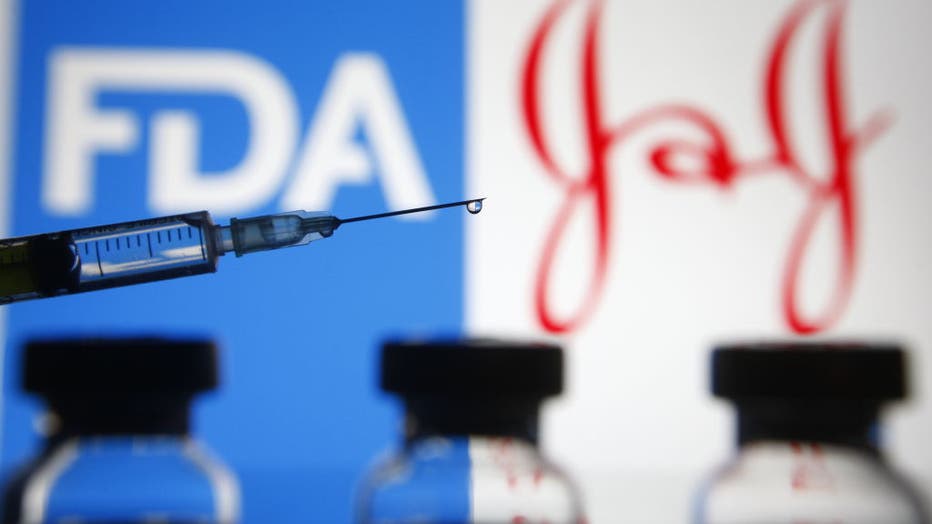US begins distribution of single-dose Johnson & Johnson COVID-19 vaccine
WASHINGTON - The nation’s third vaccine to prevent COVID-19 was being shipped across the U.S. Monday, fueling more hope in the race against a virus that already has killed more than 513,000 Americans and is mutating in increasingly worrisome ways.
Nearly 4 million doses of the newly approved Johnson & Johnson vaccine were shipped Sunday night and will begin to be delivered to states for injections starting Tuesday, officials said. The J&J vaccine is only one dose, compared to the vaccines developed by Moderna and Pfizer — which require two doses for full immunization.
The pharmaceutical company said it will deliver about 16 million more doses by the end of March and 100 million total by the end of June.
The long-awaited third vaccine was approved for emergency use on Saturday by the U.S. Food and Drug Administration. The agency said J&J’s vaccine offers strong protection against what matters most: serious illness, hospitalizations and death.

FILE - A photo illustration shows the FDA and Johnson & Johnson logos behind a medical syringe and vials. (Photo Illustration by Pavlo Gonchar/SOPA Images/LightRocket via Getty Images)
One dose was 85% protective against the most severe COVID-19 illness in a massive study that spanned three continents — protection that remained strong even in countries such as South Africa, where the variants of most concern are spreading.
"This is really good news," Dr. Francis Collins, director of the National Institutes of Health, told The Associated Press Saturday. "The most important thing we can do right now is to get as many shots in as many arms as we can."
RELATED: Johnson & Johnson's single-shot COVID-19 vaccine endorsed by FDA expert panel
On Sunday, the U.S. Centers for Disease Control and Prevention’s Advisory Committee on Immunization Practices (ACIP) also voted to recommend J&J’s vaccine for emergency use for individuals ages 18 and older.
CDC Director Dr. Rochelle Walensky called the decision "another milestone toward an end to the pandemic" and said the vaccine is "another important tool in our toolbox to equitably vaccinate as many people as possible, as quickly as possible."
Local health officials are looking to use the J&J option in mobile vaccination clinics, homeless shelters, even with sailors who are spending months on fishing vessels — communities where it’s hard to be sure someone will come back in three to four weeks for a second vaccination.
The J&J vaccine also is easier to handle, lasting three months in the refrigerator compared to the Pfizer and Moderna options, which must be frozen.
"As a one-dose vaccine, people do not have to return for a second dose to be protected," Walensky said in a statement of J&J’s shot. "In addition, this vaccine does not need to be kept in a freezer and can be stored at refrigerated temperatures – so it is easy to transport and store and allows for expanded availability in most community settings and mobile sites, as supply scales up."
In the U.S., the two-dose Pfizer and Moderna shots were 95% protective against symptomatic COVID-19. J&J’s one-dose effectiveness of 85% against severe COVID-19 dropped to 66% when moderate cases were rolled in. But there’s no apples-to-apples comparison because of differences in when and where each company conducted its studies, with the Pfizer and Moderna research finished before concerning variants began spreading.
NIH’s Collins said the evidence shows no reason to favor one vaccine over another.
"What people I think are mostly interested in is, is it going to keep me from getting really sick?" Collins said. "Will it keep me from dying from this terrible disease? The good news is all of these say yes to that."
Also, J&J is testing two doses of its vaccine in a separate large study. Collins said if a second dose eventually is deemed better, people who got one earlier would be offered another.
The FDA cautioned that it's too early to tell if someone who gets a mild or asymptomatic infection despite vaccination still could spread the virus.
Still, the J&J vaccine comes at a pivotal time. Over the last few weeks, the number of coronavirus cases and deaths have continued to decline amid increased efforts to get the American population vaccinated. But on Friday, Walensky stressed that the trajectory of the pandemic is still concerning, as emerging variants of COVID-19 could be stalling progress in beating the virus back.
"We are watching these concerning data very closely to see where they will go over the next few days," Walensky said. "But it’s important to know where we are in the pandemic. Things are tenuous. Now is not the time to relax restrictions."
More 28.6 million cases of COVID-19 have been confirmed in the U.S. and 513,000 related deaths as of Monday, data from Johns Hopkins University shows.
Over 75.2 million COVID-19 vaccine doses have been administered.
RELATED: UK variant, South Africa variant, Brazil variant: A guide to known coronavirus mutations
This story was reported from Cincinnati. The Associated Press contributed.

